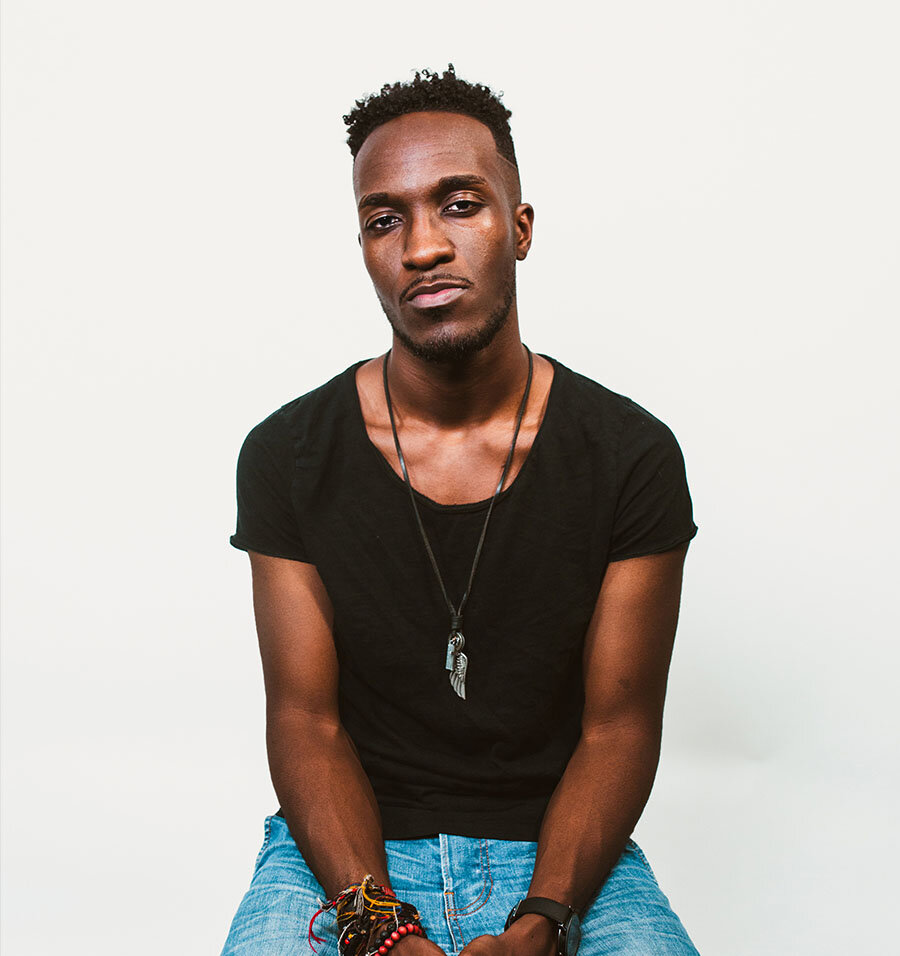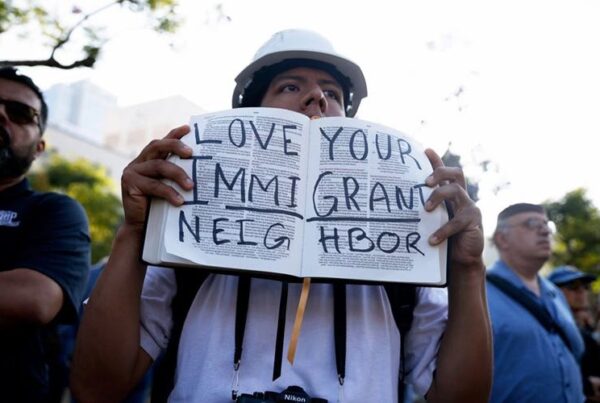This article was originally published at World Outspoken as part of a series on Afro-Latinidad. To learn more about World Outspoken, visit their website today.
How can I adequately attempt to address the complexities of the Afro-Latino/a experience in a society where we’re considered a threat by the mere virtue of having rich, melanated skin? An experience only amplified by the plight of the Afro-descendant, Spanish-speaking immigrant here in the United States.
Afro-Latinos/as are not a monolith, so our stories are varied and complex—from South America to the Caribbean to the U.S. and worldwide. But one thing we share is our rich African ancestry.
Our Rich Diasporic Roots
My family is from Colombia. Somos Afro-Colombianos. My dad is from Buenaventura, and my mom is from Cali. They are scholars, pastors, educators, and so much more. They have ministered in Colombia and other parts of the world for over 30 years. My parents, along with the rest of my extended family, immersed me in the beautiful world of my rich diasporic roots as an Afro-Latino in Colombia.
My family would have gatherings in our neighborhood in Colombia called “Sancochados,” which were parties with food, dancing, and conversation. But the most important part was el sancocho on full display in the middle of the street inside a huge cooking pot. El sancocho is a soup inspired by rich West African roots mixed with indigenous flavor. It’s a reminder of who we are and where we came from.
During the Trans-Atlantic Slave Trade, enslaved African women in Colombia were forced to cook only the best meals for their slave masters while they were left with scrapes and crumbs. What the slave masters didn’t realize was that these African women were taking the “scraps” to make the most delicious and nutritious meal for themselves and their families.
Sancocho was a reminder for these kidnapped, trafficked, and dehumanized African women that they weren’t slaves by identity but enslaved by circumstance. They were Black queens and kings, no matter what their masters said. And so, my family and I feast today.
Our Woundedness
That tradition shaped my identity as a young Black boy born in the United States but raised in part in Colombia, dealing with English as my second language and a dual identity. Growing up, my dad would share the complexities of the lived experiences of Afro-Colombianos in Colombia and even here stateside.
In Colombia, for example, our first black president was erased from history books for years because of the color of his skin. And my father can tell many more personal stories of racial injustice he and his family experienced in Colombia. By the time my family moved to the U.S. from Colombia, it was clear to us the disdain for los negros (and the resulting internalized self-hatred of Black people) wasn’t just an issue in Colombia pero tambien aquí en los Estados Unidos.
Internalized pain is part and parcel of the Afro-descendant community. More specifically, woundedness is a part of Afro-Latindad—a designation not merely for a racialized category or an insufficient pan-ethnic term, but an experience marred by a turbulent, misrepresented past and a difficult path forward.
Our Identity Crisis
Growing up, I had an identity crisis. Here stateside, we’re trained to homogenize communities and strip individuals of their rich and varied ancestral cultural identity. So I was not “Black” enough to be Black, even though I’m dark-skinned. I wasn’t embraced by the African American community because that’s not the culture I grew up in. But I also wasn’t “Latino” enough to be Latino, even though I’m Colombian. I didn’t look like white and light-brown actors on Telemundo. Somehow, being Black and Latino became mutually exclusive. I couldn’t be both. So who—or what—was I?
The fact that Afro-Latinos/as don’t fit into a Westernized construct of what it means to be “Black” doesn’t mean that we’re not Black. And the fact that Afro-Latinos/as don’t fit into a Westernized construct of “Latinidad” doesn’t mean we’re not Latino/a. Race—a human-made social construct—is a system that assigns degrees of social capital and value based on proximity to whiteness. In this system, skin color is the main and most determining feature. This created a social reality in which there is a proportional correlation between the amount of melanin in your skin and the number and nature of disparities you face in this world.
I cannot tell you how many times I’ve been discriminated against by fellow Colombians or people from Latinoamérica due to the color of my skin. Growing up in Latin American culture, I’ve been called “negro feo” (ugly Black boy), “mico” (monkey), “sucio” (dirty), etc. That sort of verbal abuse is soul-wounding and disruptive.
In some of those difficult moments, my mother’s sweet words were a balm to my soul. She would hold me while tears ran down my black cheeks. She would tell me, “Ser negro es hermoso. No te olvides, mijo.” (“To be black is beautiful. Don’t forget that, my son”).
Immigration & Anti-Blackness
Black immigrants suffer a “double punishment” because they are immigrants in a xenophobic culture, and they are Black in a white supremacist society. In the United States, Black undocumented immigrants are detained and deported at higher rates than other racial groups. But their stories are largely left out of the bigger narrative around immigration.
It is no secret to my Afro-Latino family that this country’s immigration system is unjust and biased against immigrants of African descent. For years, my parents, sisters, and extended family dealt with debasing comments and treatment by immigration officials, as well as predatory and neglectful immigration lawyers.
But this current administration—and its president—has been the single greatest threat to my family since we immigrated here from Colombia. The rhetoric used by this administration to vilify Brown and Black immigrants has only empowered ICE (Immigration and Customs Enforcement) and immigration policy makers to remove immigrants from this country in some of the most dehumanizing ways.
Unfortunately, my family and I have personally experienced this. Just last year, our world was turned upside down when my tío and tía were unjustly deported after following the laws of the land for nearly 20 years. Their deportation had traumatic emotional, financial, organizational, and relational ramifications for our family over the last year. Their journey has only reminded us how corrupt and racist our immigration system is.
Our Anti-Black Histories
Anti-Blackness is a global issue, and it is prevalent in Latin America. During the Trans-Atlantic Slave Trade in the 1500s–1800s, over 11 million Africans disembarked from slave ships. Of those 11 million Africans who survived that brutal, inhumane transport, only 450,000 came to the United States. That means only 5%African slaves came here stateside. Five percent.
It shouldn’t surprise us, then, to learn that anti-Black immigration policies aren’t unique to the United States. In Brazil, for example, immigration policies were put into place after 1850 in order to receive over five million European immigrants from 1872 to 1975. Why? They wanted to “whiten” the country.
Hate was not the only culprit that led to the dehumanization of the African Diaspora. It was self-interest motivated by economic gain that justified the thought that we were not human. Here in the United States, trafficked Africans were enslaved and forbidden to speak their native tongue. By the unmerciful hand of a master’s guile, these African immigrants were stripped of their God-given dignity by these slave masters who perverted God’s Word.
Anti-Blackness Today
Today’s racist ideologies, policies, and institutions perpetuate the anti-Blackness of yesterday. Afro-Latinos/as are often stifled in our societal advancement and human flourishing. Centuries of micro-aggressions are perpetuated by fear of afrodescendientes and corrupt systemic structures that further diminish God’s image-bearers (Gen. 1:26–27).
K.A. Ellis once said, “Satan is uncreative in how he deploys destructive and dehumanizing ideologies, but he’s particularly good at repackaging oppression. Looking through history, we see his tactics repeat.”
Oppression is repackaged. Acquiring knowledge about the pervasive air of anti-Blackness in our society is easy. What’s difficult is to know how we can be active and complicit in anti-Blackness and oppression against Afro-Latinos/as.
A Way Forward
Afro-Latino/as are a growing population. According to the Pew Research Center, almost a quarter of all U.S. Hispanics identified as Afro-Latinos (Afro-Caribbean or of African descent) in 2016. Within our families and communities, we need spaces where we can heal and have meaningful conversations of what it means to be Afro-Latino/a.
We need to learn and celebrate the richness of our African heritage expressed in various forms. Cumbia, for example, is a traditional Colombian dance created by enslaved Africans who worked mines. The small foot movements of the dance mimic the only movements their feet were allowed while bound by chains.
Music from Grupo Niche, ChocQuibTown, and others also proudly represent the flavor of Afro-Latinidad. Colombian star Shakira recently paid respect to Afro-Colombians during her Super Bowl performance by dancing Champeta & Mapalé—dances created by enslaved Africans in Colombia.
These kinds of positive representations are a better way forward than media and entertainment that only portrays Afro-Latinos/as as hyper-sexualized villains, criminals, and brujas (witches).
Who Are We?
Soy Afro-Colombiano. I am a product of the Afro-Latino/a Diaspora. The blood and resilience of my West African ancestry runs deep inside this beautiful, sun-kissed skin.
Somos Afro-Latino/as. We’re the African diamond exported from its homeland and extorted in foreign places. Far from home, our perceived value has depreciated by virtue of white supremacy. But it is not lost. Its true worth was never truly lost or depreciated because it’s God given.
Who are we? We’re like the sugar in coffee. You can’t see us—our value is hidden and largely untold—but best believe, we bring the flavor.

Jon Aragón is an Afro-Colombiano entrepreneur, advocate, and multidisciplinary designer. A proud son of Colombian immigrants, Jon has a heart for the unique beauty and challenges of immigrants and Afro-Latino/a people. He’s worked with World Relief, advocating for DACA recipients and other immigration issues on Capitol Hill. He currently works with the Chasing Justice team and is the founder of Jon Doulos. He’s also the creative director and co-owner of Native Supply. Jon resides in Tampa, FL with his wife, Quina, and their daughter.
The views and opinions expressed on the Chasing Justice Blog are those of the authors and do not necessarily reflect the official policy or position of Chasing Justice. Any content provided by our bloggers or authors are of their opinion and are not intended to malign any religion, ethnic group, club, organization, company, individual or anyone or anything.







